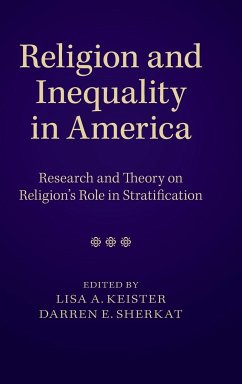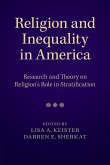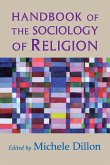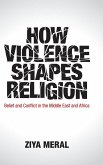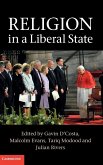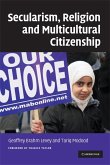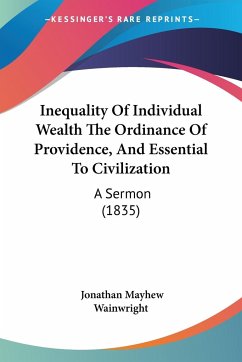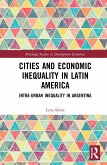Religion and Inequality in America
Research and Theory on Religion's Role in Stratification
Herausgeber: Keister, Lisa A.; Sherkat, Darren E.
Religion and Inequality in America
Research and Theory on Religion's Role in Stratification
Herausgeber: Keister, Lisa A.; Sherkat, Darren E.
- Gebundenes Buch
- Merkliste
- Auf die Merkliste
- Bewerten Bewerten
- Teilen
- Produkt teilen
- Produkterinnerung
- Produkterinnerung
Examines how social inequality is affected by religious beliefs and affiliation, with contributions in the fields of religion and sociology.
Andere Kunden interessierten sich auch für
![Religion and Inequality in America Religion and Inequality in America]() Religion and Inequality in America39,99 €
Religion and Inequality in America39,99 €![Handbook of the Sociology of Religion Handbook of the Sociology of Religion]() Michele Dillon (ed.)Handbook of the Sociology of Religion60,99 €
Michele Dillon (ed.)Handbook of the Sociology of Religion60,99 €![How Violence Shapes Religion How Violence Shapes Religion]() Ziya MeralHow Violence Shapes Religion93,99 €
Ziya MeralHow Violence Shapes Religion93,99 €![Religion in a Liberal State Religion in a Liberal State]() Religion in a Liberal State75,99 €
Religion in a Liberal State75,99 €![Secularism, Religion and Multicultural Citizenship Secularism, Religion and Multicultural Citizenship]() Secularism, Religion and Multicultural Citizenship47,99 €
Secularism, Religion and Multicultural Citizenship47,99 €![Inequality Of Individual Wealth The Ordinance Of Providence, And Essential To Civilization Inequality Of Individual Wealth The Ordinance Of Providence, And Essential To Civilization]() Jonathan Mayhew WainwrightInequality Of Individual Wealth The Ordinance Of Providence, And Essential To Civilization20,99 €
Jonathan Mayhew WainwrightInequality Of Individual Wealth The Ordinance Of Providence, And Essential To Civilization20,99 €![Cities and Economic Inequality in Latin America Cities and Economic Inequality in Latin America]() Lena SimetCities and Economic Inequality in Latin America126,99 €
Lena SimetCities and Economic Inequality in Latin America126,99 €-
-
-
Examines how social inequality is affected by religious beliefs and affiliation, with contributions in the fields of religion and sociology.
Hinweis: Dieser Artikel kann nur an eine deutsche Lieferadresse ausgeliefert werden.
Hinweis: Dieser Artikel kann nur an eine deutsche Lieferadresse ausgeliefert werden.
Produktdetails
- Produktdetails
- Verlag: Cambridge University Press
- Seitenzahl: 380
- Erscheinungstermin: 9. Juni 2014
- Englisch
- Abmessung: 235mm x 157mm x 25mm
- Gewicht: 700g
- ISBN-13: 9781107027558
- ISBN-10: 1107027551
- Artikelnr.: 41124355
- Herstellerkennzeichnung
- Libri GmbH
- Europaallee 1
- 36244 Bad Hersfeld
- gpsr@libri.de
- Verlag: Cambridge University Press
- Seitenzahl: 380
- Erscheinungstermin: 9. Juni 2014
- Englisch
- Abmessung: 235mm x 157mm x 25mm
- Gewicht: 700g
- ISBN-13: 9781107027558
- ISBN-10: 1107027551
- Artikelnr.: 41124355
- Herstellerkennzeichnung
- Libri GmbH
- Europaallee 1
- 36244 Bad Hersfeld
- gpsr@libri.de
Foreword N. J. Demerath; Introduction Lisa A. Keister and Darren E.
Sherkat; Part I. Education: 1. Nonaffiliation and socioeconomic status:
differences in education and income between atheists and agnostics and
'nothing in particulars' Rebekah Peeples Massengill; 2. Religion, gender,
and educational attainment among US immigrants: evidence from the new
immigrant survey Nadia Amin and Darren E. Sherkat; 3. Intersectionality and
identity: an exploration of Arab-American women Jen'nan Ghazal Read and
David Eagle; Part II. Income, Wealth, and the Labor Market: 4. Conservative
protestantism, normative pathways, and adult attainment Scott T. Fitzgerald
and Jennifer L. Glass; 5. Religion and wealth mobility: the case of
American Latinos Lisa A. Keister and E. Paige Borelli; 6. The labor market
behavior of married women with young children in the US: have differences
by religion disappeared? Evelyn L. Lehrer and Yu Chen; Part III. Attitudes,
Cultural Capital, and Power: 7. Religion and gender inequality: from
attitudes to practices John P. Bartkowski and Sarah Shah; 8. Religious
stratification and social reproduction Ralph E. Pyle and James D. Davidson;
9. God in the corner office? How religion advances and inhibits
professional mobility in the higher circles D. Michael Lindsay; 10. The
religious affiliations of ivy league presidents 1636-2012 Deborah L. Coe
and James D. Davidson; Part IV. Health and Well-being: 11. The association
between religiousness and psychological well-being among older adults: is
there an educational gradient? Christopher G. Ellison, Scott H. Schieman
and Matt Bradshaw; 12. Does believing or belonging have a greater
protective effect on stressful life events among young adults? Margarita
Mooney, Lin Wang, Jason Freeman and Matt Bradshaw; 13. Faith, jobs, money,
and happiness during the great recession, 2006-10 Michael Hout and Orestes
P. Hastings; Part V. Inequality and Religion: 14. Reversing the arrow?
Economic inequality's effect on religiosity Frederick Solt.
Sherkat; Part I. Education: 1. Nonaffiliation and socioeconomic status:
differences in education and income between atheists and agnostics and
'nothing in particulars' Rebekah Peeples Massengill; 2. Religion, gender,
and educational attainment among US immigrants: evidence from the new
immigrant survey Nadia Amin and Darren E. Sherkat; 3. Intersectionality and
identity: an exploration of Arab-American women Jen'nan Ghazal Read and
David Eagle; Part II. Income, Wealth, and the Labor Market: 4. Conservative
protestantism, normative pathways, and adult attainment Scott T. Fitzgerald
and Jennifer L. Glass; 5. Religion and wealth mobility: the case of
American Latinos Lisa A. Keister and E. Paige Borelli; 6. The labor market
behavior of married women with young children in the US: have differences
by religion disappeared? Evelyn L. Lehrer and Yu Chen; Part III. Attitudes,
Cultural Capital, and Power: 7. Religion and gender inequality: from
attitudes to practices John P. Bartkowski and Sarah Shah; 8. Religious
stratification and social reproduction Ralph E. Pyle and James D. Davidson;
9. God in the corner office? How religion advances and inhibits
professional mobility in the higher circles D. Michael Lindsay; 10. The
religious affiliations of ivy league presidents 1636-2012 Deborah L. Coe
and James D. Davidson; Part IV. Health and Well-being: 11. The association
between religiousness and psychological well-being among older adults: is
there an educational gradient? Christopher G. Ellison, Scott H. Schieman
and Matt Bradshaw; 12. Does believing or belonging have a greater
protective effect on stressful life events among young adults? Margarita
Mooney, Lin Wang, Jason Freeman and Matt Bradshaw; 13. Faith, jobs, money,
and happiness during the great recession, 2006-10 Michael Hout and Orestes
P. Hastings; Part V. Inequality and Religion: 14. Reversing the arrow?
Economic inequality's effect on religiosity Frederick Solt.
Foreword N. J. Demerath; Introduction Lisa A. Keister and Darren E.
Sherkat; Part I. Education: 1. Nonaffiliation and socioeconomic status:
differences in education and income between atheists and agnostics and
'nothing in particulars' Rebekah Peeples Massengill; 2. Religion, gender,
and educational attainment among US immigrants: evidence from the new
immigrant survey Nadia Amin and Darren E. Sherkat; 3. Intersectionality and
identity: an exploration of Arab-American women Jen'nan Ghazal Read and
David Eagle; Part II. Income, Wealth, and the Labor Market: 4. Conservative
protestantism, normative pathways, and adult attainment Scott T. Fitzgerald
and Jennifer L. Glass; 5. Religion and wealth mobility: the case of
American Latinos Lisa A. Keister and E. Paige Borelli; 6. The labor market
behavior of married women with young children in the US: have differences
by religion disappeared? Evelyn L. Lehrer and Yu Chen; Part III. Attitudes,
Cultural Capital, and Power: 7. Religion and gender inequality: from
attitudes to practices John P. Bartkowski and Sarah Shah; 8. Religious
stratification and social reproduction Ralph E. Pyle and James D. Davidson;
9. God in the corner office? How religion advances and inhibits
professional mobility in the higher circles D. Michael Lindsay; 10. The
religious affiliations of ivy league presidents 1636-2012 Deborah L. Coe
and James D. Davidson; Part IV. Health and Well-being: 11. The association
between religiousness and psychological well-being among older adults: is
there an educational gradient? Christopher G. Ellison, Scott H. Schieman
and Matt Bradshaw; 12. Does believing or belonging have a greater
protective effect on stressful life events among young adults? Margarita
Mooney, Lin Wang, Jason Freeman and Matt Bradshaw; 13. Faith, jobs, money,
and happiness during the great recession, 2006-10 Michael Hout and Orestes
P. Hastings; Part V. Inequality and Religion: 14. Reversing the arrow?
Economic inequality's effect on religiosity Frederick Solt.
Sherkat; Part I. Education: 1. Nonaffiliation and socioeconomic status:
differences in education and income between atheists and agnostics and
'nothing in particulars' Rebekah Peeples Massengill; 2. Religion, gender,
and educational attainment among US immigrants: evidence from the new
immigrant survey Nadia Amin and Darren E. Sherkat; 3. Intersectionality and
identity: an exploration of Arab-American women Jen'nan Ghazal Read and
David Eagle; Part II. Income, Wealth, and the Labor Market: 4. Conservative
protestantism, normative pathways, and adult attainment Scott T. Fitzgerald
and Jennifer L. Glass; 5. Religion and wealth mobility: the case of
American Latinos Lisa A. Keister and E. Paige Borelli; 6. The labor market
behavior of married women with young children in the US: have differences
by religion disappeared? Evelyn L. Lehrer and Yu Chen; Part III. Attitudes,
Cultural Capital, and Power: 7. Religion and gender inequality: from
attitudes to practices John P. Bartkowski and Sarah Shah; 8. Religious
stratification and social reproduction Ralph E. Pyle and James D. Davidson;
9. God in the corner office? How religion advances and inhibits
professional mobility in the higher circles D. Michael Lindsay; 10. The
religious affiliations of ivy league presidents 1636-2012 Deborah L. Coe
and James D. Davidson; Part IV. Health and Well-being: 11. The association
between religiousness and psychological well-being among older adults: is
there an educational gradient? Christopher G. Ellison, Scott H. Schieman
and Matt Bradshaw; 12. Does believing or belonging have a greater
protective effect on stressful life events among young adults? Margarita
Mooney, Lin Wang, Jason Freeman and Matt Bradshaw; 13. Faith, jobs, money,
and happiness during the great recession, 2006-10 Michael Hout and Orestes
P. Hastings; Part V. Inequality and Religion: 14. Reversing the arrow?
Economic inequality's effect on religiosity Frederick Solt.

